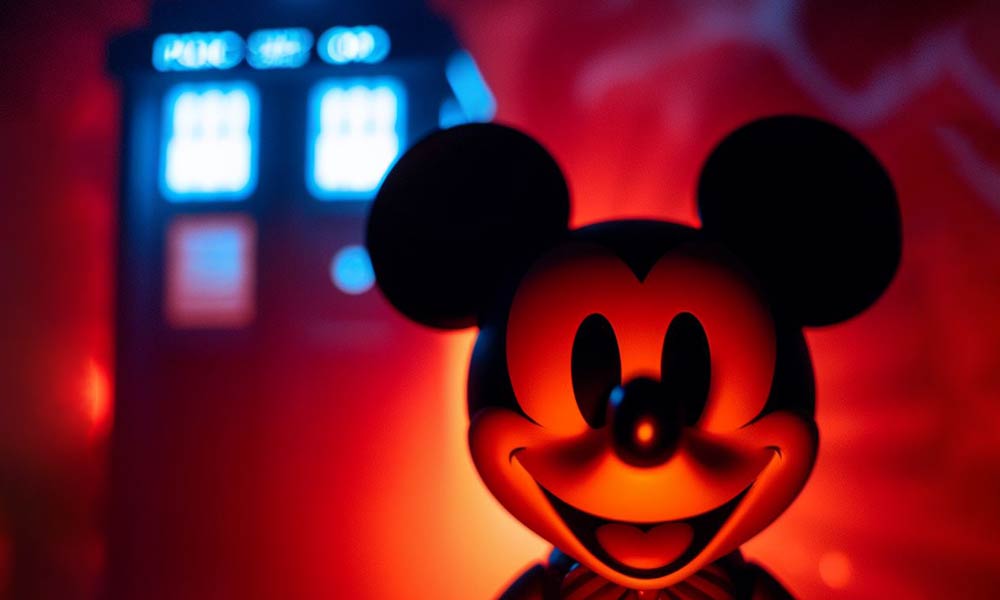Guest Feature: Is Doctor Who Being Disneyfied? The Warning Signs

Feature article by guest contributor Artie Daniels.
Disneyfication /ˌdɪz.ni.fɪˈkeɪ.ʃən/ noun
The process of transforming something, often a story or a cultural product, into a form that is more palatable, family-friendly, and commercially viable, typically in the style associated with the Disney brand. The act of simplifying, idealizing, or making something more mainstream, often at the expense of complexity, originality, or artistic integrity.
When the BBC first announced its collaboration with Disney for Doctor Who, fans like myself were left wondering: would Doctor Who end up being Disneyfied? Initially, the production team assured fans that the show wouldn’t change, which somewhat alleviated my concerns. However, having watched four episodes of the new era now, along with observing other developments, my initial concerns seem increasingly justified.
Rebranding: Season 1 or a Continuation?
One of the first red flags was the decision to officially label the 2024 series as “Season 1,” instead of the much more logical Series 14, seemingly presenting the Ncuti Gatwa era as a reboot. This situation is very different from the 16-year gap before the 2005 revival, which justified a fresh start after so long off-air. The last Chibnall episode aired in 2022, with Davies’ Who was back on screens just a year later. Adding to this is the introduction of the new “Whoniverse” sequence preceding each episode and the spin-off shows, which strongly mimics the Disney-Marvel intros. These branding changes suggest a marketing strategy tailored more towards new viewers. Such a shift in presentation raises concerns about the identity of the series under this partnership.
Changing Davros
The decision to alter Davros’ iconic appearance for the foreseeable future was, according to Russell T Davies, aimed at moving his character away from “associating disability with evil”. On the surface, this might come across as a well-intentioned effort to avoid stereotypes, but given Davies was completely fine with Davros right up until the Disney deal and still has a Davros model proudly displayed in his house (as seen in the recent documentary, The Doctor and Me), it makes you question if it bothers him as much as he proclaims. Could this have been a mandate from Disney, whose strong requirements for culturally sensitive content may be causing Davies to toe the line? It wouldn’t surprise me at all.
The Bi-generation
The introduction of “bi-generation” is a concept that deviates from the long-established regeneration process of the Time Lords. This idea seems to align with Disney’s trend in its franchises where characters are rarely given conclusive endings, keeping them alive for potential future story arcs (see the Marvel Cinematic Universe). Davies even said bi-generation led to the creation of a ‘Doctorverse’. This approach is starkly different from the essence of Doctor Who, which has always embraced finality with each regeneration. The traditional regeneration process symbolized renewal and the acceptance of change, a philosophy that seems at odds with the new direction.
Sci-Fi to Fantasy: A Shift in Genre
Russell T. Davies has not been secretive about his intentions to steer Doctor Who towards a more fantasy-oriented direction, and he asserts that this trend will only expand in Series 14 later this year. It was already strongly evident in “The Giggle” and the 2023 Christmas special, the latter of which featured Goblins and a musical number, as well as several scenes that could be considered more ‘magical’ in nature. This shift pivots Doctor Who away from its traditional science-fiction roots that have been a staple of the show since its inception. While genre evolution is not inherently problematic, it does raise questions about making the show more Disney-friendly, where fantasy and magical content is the company’s main MO.
Disney’s Direct Influence on Episodes
And finally, we have undeniable evidence of Disney’s involvement. Despite Russell T. Davies’ assurance of keeping creative control, there have already been instances where Disney’s feedback has directly influenced the show’s content, even going as far as requiring the shooting of new scenes. For example, Davies himself revealed on the episode’s commentary that after Disney tested the 2023 Christmas special, they wanted the Doctor to appear more in the episode. This led to some last-minute scene additions: one where the Doctor saves the woman with the pram from a falling snowman decoration, and the other when the Doctor talks to a policeman. This direct response to Disney’s feedback reveals without question they have a much more active role in shaping an episode’s narrative than was initially let on. And this is just the beginning of the era! Consider the potential extent of similar changes implemented in Series 14…
Conclusion
I hope I’m wrong about this. I really do, but it’s hard to deny the signs of Disneyfication already when you consider these points. In closing, I can only ask: Will these changes enrich Doctor Who in the long term, or will they lead to a loss of the show’s identity? Only time will tell, but I’m not optimistic…








